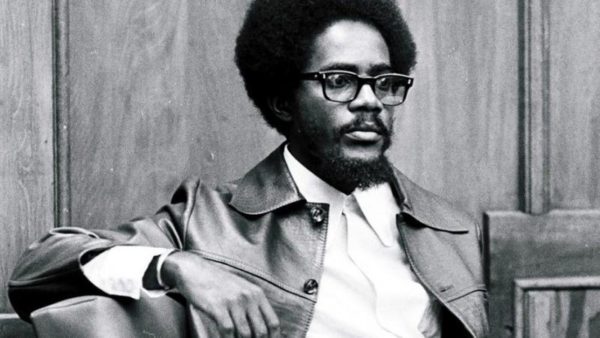‘It’s Been a Long Journey’: Guyana to Formally Recognize Revolutionary Scholar Dr. Walter Rodney 41 Years After His Assassination
The government of Guyana announced in June that it would formally recognize scholar Dr. Walter Rodney 41 years after he was assassinated and clarify the circumstances surrounding his death.
Attorney General and Minister of Legal Affairs Anil Nandlall said in a statement that the government would honor Rodney by changing details on his death certificate and making his gravesite a national monument. Nandlall said the efforts follow a request from Rodney’s family, who has sought justice for decades.
Dr. Walter Rodney (National Security Archives)
Rodney, a Guyanese political activist and academic, was assassinated on June 13, 1980, at the age of 38 in a car explosion in his nation’s capital.
An author and critic of white supremacy, Rodney worked to unite Africans and Indians in the struggle for justice and liberation. He studied at the University of the West Indies (UWI) and later received a Ph.D. in African history from the School of Oriental and African Studies in London at the age of 24 before going on to teach the subject at UWI as a lecturer.
The revolutionary was banned from entering Jamaica in 1968 because he was believed to be a threat to the state. By that time, Jamaica had banned the writings of Black activists like Malcolm X and Stokely Carmichael.
Outside of the Caribbean, Rodney led liberation movements in Africa, and in 1972 he published his seminal book “How Europe Underdeveloped Africa,” which explores how Africa was deliberately exploited and underdeveloped by colonial European powers. He returned to his native country in 1974, when he immediately began organizing on behalf of downtrodden peoples In Guyana.
On June 13, 1980, Rodney was sitting in a car with his brother Donald Rodney in Georgetown, Guyana, when the walkie-talkie on Walter’s lap exploded. Donald sustained injuries but survived, while the explosion claimed the scholar’s life. Gregory Smith, an electronics expert and marine sergeant in the Guyana Defense Force whom the activist trusted, is said to have given Rodney the device.
His death certificate currently describes Rodney as “unemployed.”
Nandlall explained, “This historical wrong will be corrected and the death certificate will be corrected to read ‘Professor’ instead of ‘unemployed.’”
The books Rodney wrote will also be placed on the national syllabus by the Ministry of Education and provided to students across the country, and The Walter Rodney Chair at the University of Guyana will be re-established and records that suggest Rodney committed wrongdoing in connection with the bombing will be expunged.
The Court of Appeals previously set aside the conviction of Donald in connection with his brother’s death. Donald, the only witness to his brother’s death, was said to have been in possession of explosives.
Rodney’s death certificate will be changed to remove the word “misadventure,” according to Nandlall. The Court of Appeals ruled in 2014 that Rodney’s death was an assassination.
Dr. Patricia Rodney, Rodney’s wife, said the family has pursued closure regarding the scholar’s death for decades.
“It’s been a long journey,” the 79-year-old retired Morehouse School of Medicine professor told Atlanta Black Star recently. Patricia’s requests seemed to get lost throughout changing administrations as new presidents entered and left office between 1980 and 2014. “It wasn’t until 2014 under President [Donald] Ramotar that again we asked for commission inquiry and that happened,” she said.
In 2016 the government changed again and the commission was aborted but by that time enough interviews had been conducted that the Commission of Inquiry was able to make its recommendations. According to Patricia, former President David A. Granger, who left office in 2020, aborted the COI.
Patricia said the term “misadventure” on her husband’s death certificate, which implicates that a person was somehow culpable in their own death, has prevented the family from claiming his life insurance policy. The change to the death certificate will reflect that Rodney was assassinated by the state, Patricia said.
Patricia also shared about the toll her husband’s assassination took on their three children, who were 9, 11 and 14 at the time of Rodney’s death. “That’s all they’ve known: struggling for justice for their father,” Patricia said. All three of the children are now in their 50s.
The couple’s four grandchildren, the oldest of whom is now 13, have also had to grow up aware of the injustice perpetrated against their grandfather.
Patricia explained, “it’s been an entire struggle for my entire family: my three children and my grandchildren. My fear was this would not happen. I never expected my children would have to deal with it and then my grandchildren would have to deal with it as well.”
According to Patricia, her husband was killed because “the government saw him as a challenge.” She added, “He was able to connect with people in a different way. He connected with people across racial lines. He did not believe that Indians and Africans should be fighting each other; that they had to work together. He did two children’s books, based on Indo-Guyanese and Afro-Guyanese, so the children could begin to understand each other’s history.”
Rodney’s family continues to engage in activism through The Walter Rodney Foundation, a nonprofit headquartered in Atlanta. A goal of the foundation is to share Rodney’s publications with students, scholars, researchers, activists around the world. Some of Rodney’s works can be found at the Atlanta University Center Robert W. Woodruff Library. Rodney’s children’s books, “Kofi Baadu Out of Africa” and “Lakshmi Out of India” will be added to the syllabus for primary and secondary schools in Guyana.

